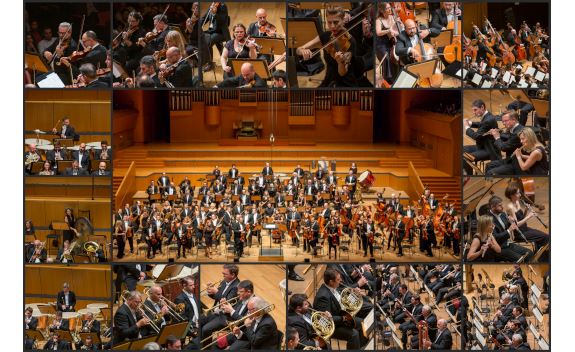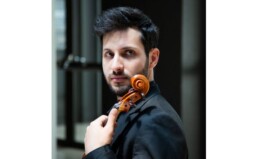Announement of an imminent call of applications to competition for permanent artistic personnel, July - August 2022
The Hellenic Ministry of Culture & Sports and the Athens State Orchestra announce that a Call for Applications to competition is imminent for six (6) vacancies in the permanent artistic personnel of the Athens State Orchestra. The vacancies are as follows:
a. One (1) position for Concertmaster
B. Category III
a. One (1) position for First Principal First in cellos
b. One (1) position for First Principal First in clarinets
C. Category IV
D. Category V
a. One (1) position for Musician in clarinets
b. One (1) position for Musician in trombones
As far as nationality is concerned, candidates must:
a) Be Greek citizens or
b) citizens of EU member states or
c) Northern Epirotes or Greek Cypriots or ethnic Greeks from Istanbul, Imbros or Tenedos; certificates of Greek ethnicity are not required, given that the Greekness of their descent and consciousness can be demonstrated in other ways. (Legislative Decree 3832/1958—ΦΕΚ 128/Α/1958).
d) Naturalized Greeks who have been Greek nationals for over a year by the submission deadline can also apply, given that they were citizens of an EU member state before their naturalization.
According to Article 3 (2b) of ΥΥΠΟ/ΚΑΤΕΧΝ/Δ/35836, a degree or diploma from a recognised conservatory or music school in Greece, or recognised music institution abroad, must be submitted when the staff member is being evaluated for a permanent position on completion of two probationary years, and not when submitting their initial application.
Auditions will be held in the Athens State Orchestra's rehearsal room in the Athens Megaron Concert Hall from Monday 25 July on, in accordance with the following schedule (the dates may shift one day either way, depending on the number of applications:
Monday 25.7.2022 & Tuesday 26.7.2022: Position for Concertmaster
Wednesday 27.7.2.2022 & Thursday 28.7.2022: Position for First Principle in cellos
Friday 29 July 2022: Position for First Principle in clarinets
Saturday 30 July 2022: Position for Musician in clarinets
Sunday 31.07.2022: Position for Second Principal in trumpets
Monday, 01.08.2022: Position of Musician in trombones
How and when applications can be submitted will be announced when the Call for Applications is made.
Candidates will be examined on the following programme:
Position for Concertmaster:
a) One of the concerti composed by Johannes Brahms, Jean Sibelius or Pyotr Ilyich Tchaikovsky, in full
b) One of Wolfgang Amadeus Mozart's following concerti: Νο 3 in G, Νο 4 in D, Νο 5 in A, first movement with cadenza
c) Johann Sebastian Bach: The 1st (slow) movement of one of his 3 violin sonatas.
d) Orchestral excerpts.
e) Prima vista.
Position for First Principal in cellos:
a) One of the concerti composed by Robert Schumann or Antonín Dvořák, in full
b) Franz Joseph Haydn: Concerto in D major, first movement with cadenza
c) Johann Sebastian Bach: A slow movement (sarabande) from one of his cello suites
d) Orchestral excerpts.
e) Prima vista.
Position for First Principal in clarinets:
a) Carl Maria von Weber: Clarinet Concerto no. 2, opus 74 in E-flat major, in full
b) Wolfgang Amadeus Mozart: Clarinet Concerto in A major, KV622, first movement with Cadenza
c) Orchestral excerpts.
d) Prima vista.
Position for First Principal in trumpets:
a) Franz Joseph Haydn: Trumpet concerto in E-flat major, 1st and 2nd movements or Johann Nepomuk Hummel: Trumpet concerto in E-flat major, 1st and 2nd movements
b) Orchestral excerpts
c) Prima vista
Position for Musician in clarinets:
a) Wolfgang Amadeus Mozart: Concerto in A major, KV622, 1st movement
b) Orchestral excerpts
c) Prima vista
Position for Musician in trombones:
a) Ferdinand David: Concerto in E-flat major, 1st movement
b) Orchestral excerpts
c) Prima vista
Greek candidates should bring their own piano accompanist. The Athens State Orchestra will provide candidates from abroad with a pianist to accompany them.
Candidates will find the orchestral extracts listed in full at the Athens State Orchestra's offices and on its website, following the publication of the Call for Applications.
Our Orchestra has just aquired five new members 2022
It is with happiness and respect that we welcome the distinguished Musicians, who have had a remarkable presence in Camerata Orchestra:
Elena Tavantzi, violin
Olga Kim, violin
Julietta Avetian, violin
Ilias Sakalak, cello
Our Orchestra welcomes as well the experienced librarian, Eleni Anastasiou
2022 03 24 Ilias Livieratos interview
Just before our performance of Mozart's Sinfonia Concertante for viola, violin and orchestra goes out on our Facebook page and YouTube channel, the soloist, our principal violist Ilias Livieratos, speaks about the work, its difficulties and historical background.
What difficulties and challenges does Mozart's Sinfonia Concertante for violin, viola and orchestra present for the performers? How does Mozart's use of the scordatura technique affect both the sound of the viola and its musical conversation with the violin?
One of Mozart's many experiments in this work is instructing the violist to tune their instrument a semitone higher, so that while everyone else is playing in E flat major (a difficult key) the viola is actually playing in the 'easy' key of D major, allowing full use to be made of its open strings.
Mozart did this for three reasons: Firstly, due to its larger size, the viola of Mozart's time was not an easy instrument to play in a virtuoso style; and that is still true today. The use of scordatura makes the soloist's job easier, especially in fast passages. Secondly, although the viola has a beautiful timbre, it cannot cut through the other instruments and make itself heard like the violin can. The scordatura increases the tension of the strings, making it more of a 'primo' instrument and helping its sound to penetrate through the orchestra and compete with the violin.
Finally, it is worth mentioning here that Mozart is known to have played the viola in his quartets, and was very fond of the instrument. Perhaps I'm committing a philosophical sleight of hand here, but knowing that Mozart had recently lost his mother (even though Mozart didn't often write in minor keys, the second movement is heart-breaking), I can't help wondering whether, in the composer's mind, the work was actually a dialogue between himself (the viola) and his mother (the violin), because the element of conversational interplay is key feature of the work. And perhaps the scordatura tells us that he, Mozart, has "changed"? We can't know such things for sure, but Mozart, being a freethinker as well, often hid meanings in his music.
What did you want to convey in your performance, and how far did you succeed?
When I perform music from the classical period (i.e. from around 1750), I always try to have the aesthetic context of the period as a reference point, and create an interpretation that is close to what we call "historically informed performance"—in simple terms, that means playing how we think Mozart himself would have played his music. That whole approach is something I immersed myself in during my years as a music student in Salzburg and Munich.
However, there is a risk that an interpretation of this sort can become academic, which, paradoxically, would make the performance anything but historical, because I simply can't believe that Mozart could ever have played in a boring academic way. That's why I always try to take musical risks and put my "soul" into what I do.
Finally we tried, even though the work is frequently performed, to give our performance something fresh, something new. It was with this in mind that we "sacrilegiously" exchanged Mozart's own cadenza for a more virtuosic and showy—if I may use the term!—passage by the much later Austrian violinist, J. Hellmesberger.
INFO:
WOLFGANG AMADEUS MOZART (1756—1791)
Sinfonia Concertante for violin, viola and orchestra in E flat major, K. 364
Faidon Miliadis, violin
Ilias Livieratos, viola
Conducted by Alkis Baltas
To watch the concert online on Friday March 25 at 20:30, visit our Facebook page or YouTube channel.


